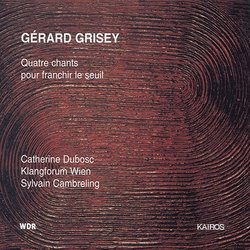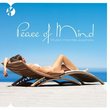| All Artists: Gerard Grisey, Sylvain Cambreling, Klangforum Wien, Catherine Dubosc Title: Gérard Grisey: Quatre chants pour franchir le seuil Members Wishing: 3 Total Copies: 0 Label: Kairos Release Date: 10/29/2002 Genres: Pop, Classical Styles: Vocal Pop, Opera & Classical Vocal Number of Discs: 1 SwapaCD Credits: 1 UPC: 782124122522 |
Search - Gerard Grisey, Sylvain Cambreling, Klangforum Wien :: Gérard Grisey: Quatre chants pour franchir le seuil
 | Gerard Grisey, Sylvain Cambreling, Klangforum Wien Gérard Grisey: Quatre chants pour franchir le seuil Genres: Pop, Classical
|
Larger Image |
CD DetailsSimilar CDs
|
CD ReviewsGrisey is not restricted by any system Luke birkla | Leeds, UK | 06/08/2004 (5 out of 5 stars) "Gerard Grisey, noted Spectralist French composer, always has something worthwile to say. His music speaks volumes; the relationship between the text and the linearity (or non-linearity) of musical progression is most absorbing, the orchestration is equisite (and like fine detail in a Dali painting), and his musical ideas are always developing, reappearing and becoming "one" with the listener. It is wonderful,listening to this cd, as each time one discovers a new aspect of this engaging musical tapestry. As with the best music, the variety of expression Grisey evokes is admirable. In lots of music, one can often find the expression lies either side of the barrier between violent and peaceable, or other such contrasts. However, in this cd, Grisey, like Bach, always provides an elusive yet utterly idiosyncratic answer, finding the balance to reconcile such differences, into an immutable force. Yes, the music can be described as an immutable force, as it suspends criticism upon hearing; the listener (hopefully!!) is held in thrall, locked in the music, for it's duration. It is important though, that with Grisey, his music does not fall prey to labelling. Grisey in an interview (...), speaks of how it was taken over by a few musicologists, reviewers and musicians, as a label. "Spectralism is not a system. It's not a system like serial music or even tonal music. It's an attitude. It considers sounds.." says Grisey. Grisey is not restricted by any system. This is a lovely cd." Grisey's last work is one of his strongest Christopher Culver | 12/06/2009 (4 out of 5 stars) ""Quatre Chants pour franchir le seuil" for soprano and 15 players (1998) was Gerard Grisey's last work, these "four songs for crossing the threshold" having been composed shortly before illness took him at the age of only 52. It's also one of his great achievements, featuring his perennial keen interest in spectral music and the perception of time, but with a great maturity and concern for humanity. Its theme is death, but with a remarkable diversity of texts, spanning the epic of Gilgamesh and Egyptian inscriptions to Erinna and Guez Ricord.
The first movement typifies right off all that is so great about Grisey's music. As it opens, the instrumentalists play a tempo canon, but one with a suppleness beyond anything in neoclassicism. The soprano then enters, intoning a text after Guez Ricord's "Les heures a la nuit". When the soprano approaches the climactic word "mort", the ensemble then imitates the voice, as Grisey has distributed its spectrum among the instruments, and they reproduce it with amazing fidelity. The second movement is a slow one with a sparse scoring, where the soprano reads from a catalogue of Egyptian tomb inscriptions, not only highlighting how death has been a perennial human concern, but revealing with haunting effect that time has erased most of these inscriptions. The third movement is short, containing only a few lines from Erinna. The fourth song, the longest, sets an extract from Gilgamesh, but here the writing for percussion takes center stage for much of the movement. Between the songs there are brief interludes consisting of silence, noise (rustling of papers), or low-dynamic tones which offer some respite from the intense texts. This is a moving piece, one that is sure to make the listener confront his own mortality. While the spectralists succeeded in returning the avant-garde to richer harmonies, there is often the stereotype that they were still bespectacled labrats. Grisey's work here shows that bold acoustic explorations can be matched to a devasting emotional impact. The one complaint I have is with the sound quality of this Kairos disc, as it is sometimes nearly down at the radio recording level. Would that a fine studio recording eventually appear. Still, that's no reason for anyone interested in Grisey's work to not seek this out as soon as possible. For those unfamiliar with Grisey or spectralist composition, his great cycle "Les Espaces Acoustiques" (as heard on an Accord disc) may be a better introduction, but I wouldn't rate these four songs much lower." |

 Track Listings (5) - Disc #1
Track Listings (5) - Disc #1
